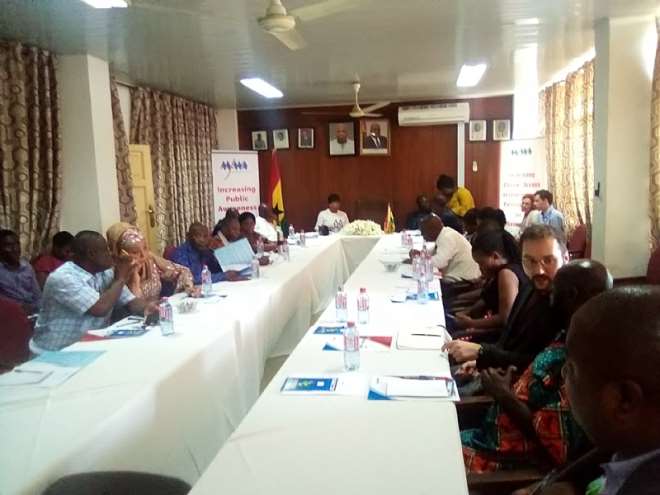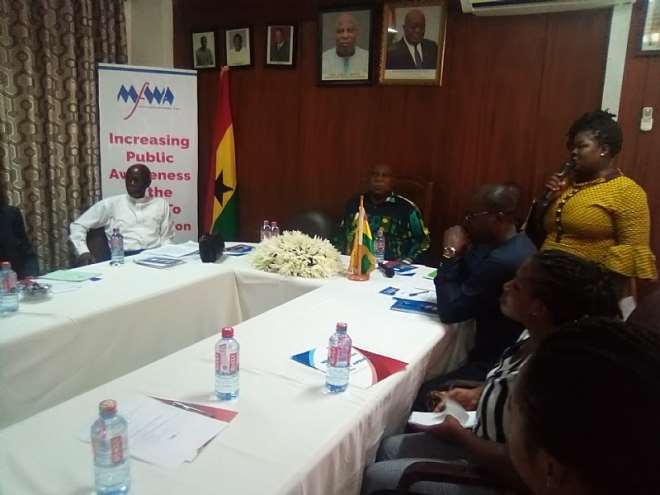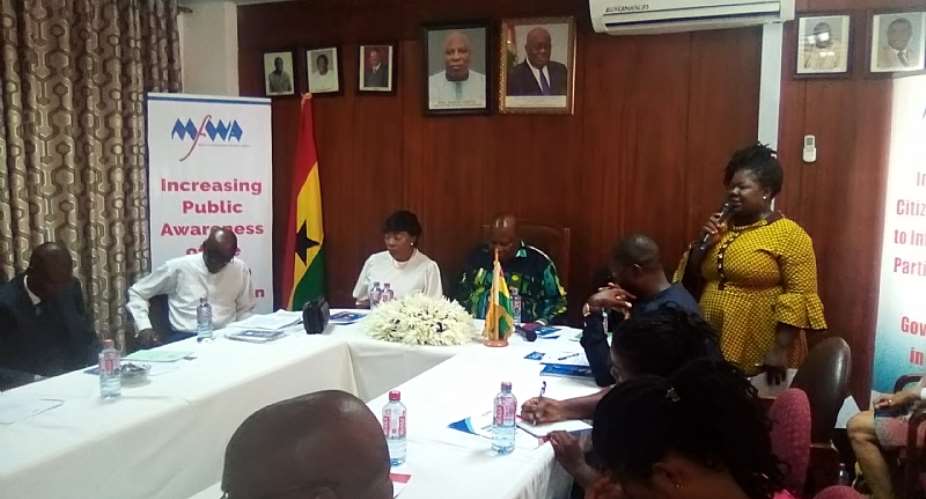A forum has been held to brief Metropolitan, Municipal and District Chief Executives (MMDCEs) in the Greater Accra Region on the Right to Information (RTI) Law.
As heads of institutions, the forum was aimed at creating awareness in order to better appreciate and understand what the RTI law places on MMDCEs in their line of duty.
The RTI law seeks to make public institutions to become very proactive in terms of their provision of information to which as MMDCEs, it is very important they get a better understanding of the law so as to create an effective and efficient mechanism to enable people have access to information from their outfits.
A Lawyer and Lecturer at the Ghana Institute of Journalism, Zakaria Tanko Musah said, “…we need to move away from this idea that the RTI Law is coming to make our work difficult. On the contrary, if we embrace it in a positive spirit, it will rather make our work easy because it will demystify governance both at the national and local levels.”
According to him, the RTI law isn’t necessarily about empowering the media as some people have raised that concern even though the media will make use of it, there are provisions in place to deal with any form of harassment and intimation from the media.
“Every professional journalist knows how to operate. And if he or she fails to operate within the professional context, there are rules and regulations to engage with to deal with these issues. We need each other for the effective implementation of the RTI Law because ultimately, the beneficiaries are all of us,” he added.
On his part, Lawyer Akoto Ampaw noted that there is the RTI Law Commission which is composed of 7 persons; a Chairperson, Vice Chairperson, 4 other members, 2 of whom must be women and an Executive Secretary who are all appointed by the president in accordance with article 70 of the constitution; in consultation with the Council of State.
The Commission has very broad powers which are to issue orders, review decisions of public institutions, receive appeals from reviewed decisions of the head of public institutions, require for the production of information that has been refused in order to make a decision on disclosure and refusal, he stressed.
Other powers the Commission, he indicated, are to monitor compliance by public institutions and relevant private bodies, issue directives to public institutions and relevant bodies for documents and also make binding decisions when an appeal has been lodged with them.
He emphasized that the Commission is a very important institution which is expected to be independent with a 5-year tenure subject to renewal for another term of 5years.
"Their work shall not be bound by legal technicalities in procedure so as to assist the ordinary person to enforce his or her right to RTI and the commission under the law is located only in Accra," he emphasised.
Lawyer Akoto Ampaw concluded that the RTI Law which provides a region of effective management of dissemination of information enables MMDCEs to have a good relationship with the media.
The Municipal Chief Executive (MCE) of Ablekuma North, Kofi Ofori in his reaction said, “now we also know our rights when it comes to how to give information out. We are happy about the whole thing.”
The forum which was organized by the Media Foundation for West Africa (MFWA) and supported by DW Akademie took place on 27th November, 2019 at the Greater Accra Regional Coordinating Council Conference Hall.
Also in attendance were Ishmael Ashitey, Greater Accra Regional Minister and his Deputy, Elizabeth Kwatsoo Tetteh Sackey; Sulemana Braimah, Executive Director, MFWA; Ernest Nyagbe, Chief Director, Greater Accra Regional Coordinating Council, among others.








 Whoever participated in the plunder of the state must be held accountable – Jane...
Whoever participated in the plunder of the state must be held accountable – Jane...
 A vote for John and Jane is a vote to pull Ghana from the precipice of destructi...
A vote for John and Jane is a vote to pull Ghana from the precipice of destructi...
 I’ll repay your abiding confidence with loyalty, understanding and a devotion to...
I’ll repay your abiding confidence with loyalty, understanding and a devotion to...
 ‘I’ve learnt deeply useful lessons for the future' — Serwaa Amihere breaks silen...
‘I’ve learnt deeply useful lessons for the future' — Serwaa Amihere breaks silen...
 I’m sorry for the embarrassment – Serwaa Amihere apologises for leaked sex video
I’m sorry for the embarrassment – Serwaa Amihere apologises for leaked sex video
 Dumsor: Matthew Opoku Prempeh not in charge of Energy sector – Minority
Dumsor: Matthew Opoku Prempeh not in charge of Energy sector – Minority
 Adu Boahen’s murder: Police arrest house help who was in possession of deceased’...
Adu Boahen’s murder: Police arrest house help who was in possession of deceased’...
 Akufo-Addo nominates Felicia Attipoe as Tema West MCE
Akufo-Addo nominates Felicia Attipoe as Tema West MCE
 Election 2024: I can't have someone I defeated twice as my successor – Akufo-Add...
Election 2024: I can't have someone I defeated twice as my successor – Akufo-Add...
